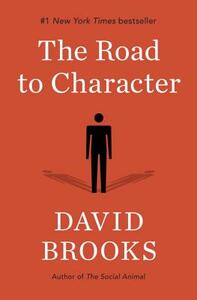Take a photo of a barcode or cover
I do not agree with many of David Brooks’s political opinions, but I thought this book had some valuable things to say about the importance of moral strength of character, of the need for reflection, and of honesty about one’s shortcomings. He has a more balanced view of contemporary ideas of “self-esteem” than I expected, but I think he misreads the current eagerness for money as greed rather than a sign of desperate times.
I also thoroughly enjoyed reading different histories and learning about people (mainly Americans) I had not heard of before.
I also thoroughly enjoyed reading different histories and learning about people (mainly Americans) I had not heard of before.
I didn't enjoy this as much as I thought I would, having seen David Brooks speak about it. There's a lot in the premise that I either agree with, or was interested in reading more on. That said, I didn't find this to be a compelling read, nor were any of the people mentioned particularly resonant. Could have also done without the Adam 1/2 thing.
I picked up this book as it was in a recommendation list from YC. Reading this was a mistake.
The book is almost christian propaganda. It presents the stories of a few famous people in history - almost all of the un relatable in the modern world and how they built character.
This book also does not quote any scientific studies or data - this is a highly christian view of how people should live from the author.
I don't recommend reading this.
The book is almost christian propaganda. It presents the stories of a few famous people in history - almost all of the un relatable in the modern world and how they built character.
This book also does not quote any scientific studies or data - this is a highly christian view of how people should live from the author.
I don't recommend reading this.
informative
reflective
fast-paced
Insightful stories, but at times quiet preachy. The writer himself says how hard it is to instill character through words. It must be gained from experience. These stories at least bring us awareness and perhaps make us seize the opportunities when they present themselves.
This is thoughtful, methodical with excellent examples of those with character. Makes you consider your "adam I" and "adam II" approach to life. Also makes one want to read St Augustine or Samuel Johnson.
While I didn't fully agree with some of what Brooks says, I really appreciated the wide variety of people he used as examples of character development. He seems to consider each individual meticulously and with wonder and empathy, even when describing the darker details of their life. It was also great timing, as this year was a personal reckoning for me and many of us in terms of what a career means, what it doesn't mean, what we're worth outside of our accomplishments and our labor, what we dedicate the majority of our time to, etc. The last chapter was especially useful in this regard. Will have to come back to this one.
As an introvert that shies away from being the center of attention, this book held a certain appeal to me. It laments the “Look at Me!” culture that is prevalent these days. It also appeals to my Buddhist leanings by focusing on suffering. However, it goes a little too far to and says that no one can be truly great without suffering. The biographies it uses to get, these points across were really interesting. But Mr. Brooks’ attempts to philosophize about the traits he was highlighting came across as a “get-off-my-lawn” old crotchety man mentality at times. Again, something I can relate to. But in the end, it was a book whose premise was better than its execution.
That said, if you’re interested in learning about A. Philip Randolf, Eisenhower, George Elliot, St. Augustine, and others then you may find enough in this book to like.
That said, if you’re interested in learning about A. Philip Randolf, Eisenhower, George Elliot, St. Augustine, and others then you may find enough in this book to like.
"When most people think about the future, they dream up ways they might live happier lives. But notice this phenomenon. When people remember the crucial events that formed them, they don't usually talk about happiness. It is usually the ordeals that seem most significant. Most people shoot for happiness but feel formed through suffering."
"Some people seem to have been born into this world with a sense of indebtedness for the blessing of being alive. They are aware of the transmission of generations, what has been left to them by those who came before, their indebtedness to their ancestors, their obligations to a set of moral responsibilities that stretch across time."
"Augustine found himself feeling increasingly isolated. If you organize your life around your own wants, other people become objects for the satisfaction of your own desires. Everything is coldly instrumental. Just as a prostitute is rendered into an object for the satisfaction of orgasm, so a professional colleague is rendered into an object for the purpose of career networking, a stranger is rendered into an object for the sake of making a sale, a spouse is turned into an object for the purpose of providing you with love.
We use the would "lust" to refer to sexual desire, but a broader, better meaning is selfish desire. A true lover delights to serve his beloved. But lust is all incoming. The person in lust has a void he needs filled by others. Because he is unwilling to actually serve others and build a full reciprocal relationship, he never fills the emotional emptiness inside. Lust begins with a void and ends with a void."
Augustine referring to the death of his wife..." it went very hard with me....Because I had now lost the great comfort of her, my soul was wounded and my very life torn asunder, for it and been on life----made of hers and mine together."
"Some people seem to have been born into this world with a sense of indebtedness for the blessing of being alive. They are aware of the transmission of generations, what has been left to them by those who came before, their indebtedness to their ancestors, their obligations to a set of moral responsibilities that stretch across time."
"Augustine found himself feeling increasingly isolated. If you organize your life around your own wants, other people become objects for the satisfaction of your own desires. Everything is coldly instrumental. Just as a prostitute is rendered into an object for the satisfaction of orgasm, so a professional colleague is rendered into an object for the purpose of career networking, a stranger is rendered into an object for the sake of making a sale, a spouse is turned into an object for the purpose of providing you with love.
We use the would "lust" to refer to sexual desire, but a broader, better meaning is selfish desire. A true lover delights to serve his beloved. But lust is all incoming. The person in lust has a void he needs filled by others. Because he is unwilling to actually serve others and build a full reciprocal relationship, he never fills the emotional emptiness inside. Lust begins with a void and ends with a void."
Augustine referring to the death of his wife..." it went very hard with me....Because I had now lost the great comfort of her, my soul was wounded and my very life torn asunder, for it and been on life----made of hers and mine together."
Confession, after renewing this book I still wasn't able to finish it after working on it for about two months. I'm usually one to finish books and I usually stick it out just to finish it, but the library fees weren't worth it for me on this one. To start, I wasn't a huge fan of David Brooks' writing. I found it to be very repetitive in an attempt to be descriptive. I could forgive that, were it not for the subjects he chose for his study of character. I found that while they each had an admirable trait, I still didn't really like any of his subjects. I don't think you can hold up Dwight Eisenhower as a pillar of character when he is keeping a mistress, for example. I didn't find the people very inspiring, which I feel was the whole point. I probably missed out by skipping the last chapter. Brooks may have tied it all together in a satisfying way, but I didn't want to keep plodding through the rest of the stories just to get to the summation.


